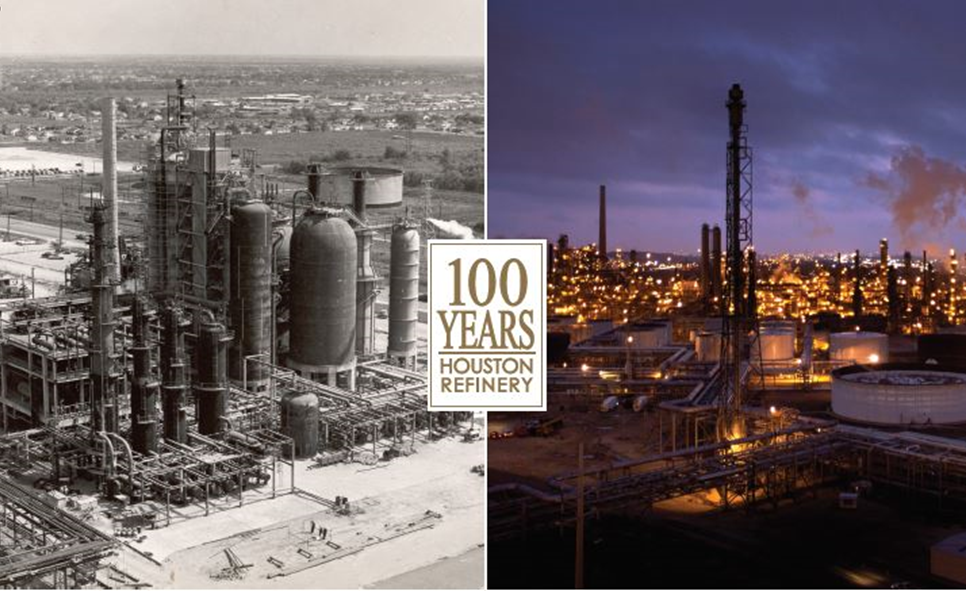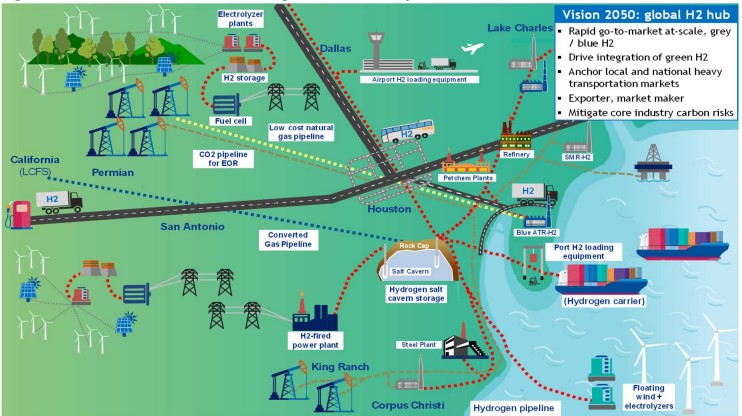Houston, Texas, is not just known for its sprawling urban landscape and cultural diversity—it’s also the undisputed “Energy Capital of the World.” Home to more than 4,600 energy-related firms and the headquarters of numerous global oil, gas, and renewable energy giants, Houston holds a dominant position in the energy industry. But how did this city, which started as a modest settlement along the Buffalo Bayou, become the heart of the world’s energy sector? Let’s explore the journey that transformed Houston into a global powerhouse of energy production and innovation.
1. Houston’s Early Beginnings: From Railroads to Refineries
Houston wasn’t always the energy titan it is today. The city’s roots lie in its position as a transportation hub in the 19th century. With access to major railroads and proximity to the Gulf of Mexico, Houston grew as a commercial center.

The turning point came in 1901 with the discovery of the Spindletop oil field near Beaumont, Texas. This event unleashed an oil boom that changed the region’s fortunes forever. The newfound wealth and investment in oil exploration quickly spread to Houston, which had the infrastructure needed to support rapid growth in the energy sector.
Houston’s strategic location near the Gulf of Mexico, a key port for international trade, made it an ideal base for companies looking to refine and transport oil globally. By the early 20th century, Houston had already begun laying the groundwork to become a major player in the energy game.
2. The Growth of the Oil and Gas Industry
The discovery of oil wasn’t just a flash in the pan for Houston. In fact, it was only the beginning of a lasting relationship between the city and the energy industry. Over the following decades, Houston became a hotbed for oil and gas activity, drawing engineers, geologists, and entrepreneurs from all over the country.

One of the key moments in this transformation was the construction of the Houston Ship Channel in 1914. The channel allowed Houston to develop one of the largest and most efficient port systems in the United States, making it easier to transport crude oil, petroleum products, and eventually, natural gas to domestic and international markets.
The Texas oil boom of the 1930s and 1940s further solidified Houston’s role in the global energy market. The city became home to the headquarters of some of the world’s largest oil companies, including ExxonMobil, Chevron, and Shell. These corporations chose Houston for its strategic location, business-friendly environment, and deep connection to the energy industry.
Houston’s rise coincided with America’s increasing reliance on oil as a key source of energy. As oil became more integral to the global economy, Houston grew in importance as the center of oil exploration, production, and distribution.
3. Innovation and Expansion in Energy Technology
Houston’s dominance in the energy industry is not only due to its rich oil reserves but also to its spirit of innovation. The city became a hub for technological advancements in the exploration and extraction of oil and gas.

For example, offshore drilling, one of the most revolutionary technologies in energy production, was pioneered in the Gulf of Mexico by companies headquartered in Houston. This innovation allowed energy firms to tap into vast reserves of oil located beneath the ocean floor, further expanding the city’s influence in global energy markets.
Additionally, the city’s strong network of engineering and research institutions, including the University of Houston and Rice University, contributed to advances in energy technologies. The collaboration between academia, private industry, and government has fostered a culture of continuous innovation in Houston.

Beyond oil and gas, Houston has also diversified into other areas of energy, including renewable energy. As global demand for cleaner energy sources grows, Houston is now positioning itself as a leader in wind, solar, and bioenergy technologies. The city’s forward-thinking approach is what keeps it at the forefront of the energy sector.
4. A Global Hub for Energy Companies
Over the past century, Houston has developed into a global hub for energy corporations. The city is now home to more than 5,000 energy-related firms, ranging from oil and gas to renewables and emerging technologies. Many of the world’s largest energy companies have chosen Houston as their operational base due to its concentration of talent, infrastructure, and resources.

- ExxonMobil, the largest publicly traded oil and gas company, has its roots deeply embedded in Houston’s economy. Its research and development facilities and corporate offices employ thousands of Houstonians.
- Shell, another global giant, operates its U.S. headquarters out of Houston, contributing to the city’s status as an energy mecca.
- ConocoPhillips, Halliburton, and Schlumberger, three more energy behemoths, also call Houston home, further cementing the city’s position as the global leader in energy services and technologies.
The Houston Energy Corridor, located on the west side of the city, is a 7,000-acre area that houses over 300 energy companies. This concentration of firms, professionals, and industry know-how makes the Energy Corridor one of the most influential business districts in the world.
5. Houston and the Future of Energy
Despite its rich history in oil and gas, Houston is not resting on its laurels. The city has been proactive in embracing the future of energy, including cleaner and more sustainable alternatives. In recent years, Houston has been investing in renewable energy projects and has become a hub for wind and solar energy research.

Additionally, Houston’s Mayor’s Office of Sustainability has laid out ambitious goals for reducing the city’s carbon footprint and transitioning to greener energy sources. Houston’s leadership in renewable energy innovation is setting the stage for the city to be a major player in the global transition to cleaner energy.
Moreover, energy startups have found a supportive environment in Houston, with various energy incubators and programs helping new businesses in fields like energy storage, energy efficiency, and electric vehicles. This forward-thinking approach ensures that Houston will remain the center of the energy universe, no matter how the industry evolves.
A Legacy of Energy Leadership
From the discovery of oil at Spindletop to its current role as the global energy capital, Houston’s journey is a testament to the city’s innovation, resilience, and entrepreneurial spirit. With a legacy built on oil and gas and a future embracing renewable energy, Houston continues to lead the way in powering the world. Its strategic location, world-class infrastructure, and unmatched expertise in energy ensure that the city will remain the undisputed energy capital of the world for generations to come.